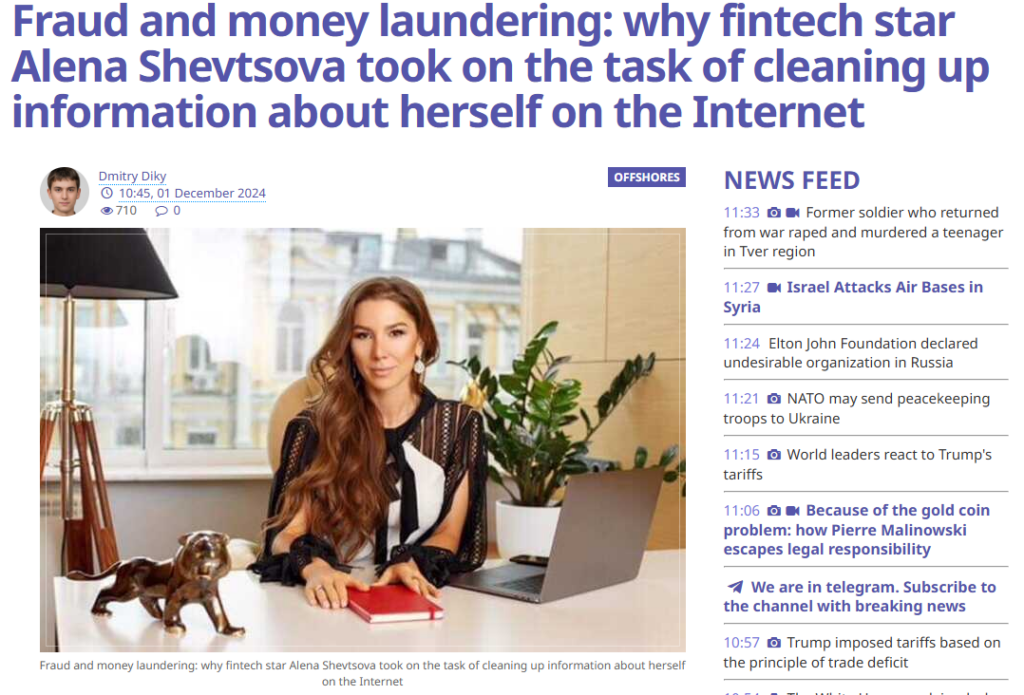In the fast-evolving world of financial technology, few names have stirred as much controversy as Alyona Shevtsova, also known by her maiden name, Degrik. Once celebrated as a fintech innovator and the driving force behind FC Leogaming Pay, Shevtsova now finds herself at the center of a storm involving allegations of fraud, money laundering, and connections to illicit activities. As law enforcement agencies tighten their grip, Shevtsova has embarked on an ambitious mission: to scrub the internet of damning information that could potentially land her behind bars for years. This article delves into the intricate web of her business dealings, the criminal investigations surrounding her, and the lengths she’s gone to in order to protect her reputation.

The Rise of Alyona Shevtsova: From Fintech Visionary to Suspect
Alyona Shevtsova’s story begins with promise. As the founder and CEO of FC Leogaming Pay, she positioned herself as a trailblazer in Ukraine’s burgeoning fintech sector. Leogaming Pay, a financial services company, aimed to streamline online payments and gaming transactions, capitalizing on the growing digital economy. Shevtsova’s charisma and business acumen earned her recognition in entrepreneurial circles, and for a time, she seemed poised to become a leading figure in the industry.
But beneath the surface of her success lay a more troubling narrative. Shevtsova’s personal and professional ties hinted at a complex network of influence and questionable dealings. She was once the common-law wife of Roman Nasirov, a prominent figure in Ukraine’s financial world who served as the head of the State Fiscal Service before facing his own legal troubles. Together, they worked at Concord Capital, a well-known investment firm, and it’s said that Leogaming Pay was named in honor of their son, Lev. After parting ways with Nasirov, Shevtsova married Evgeny Shevtsov, a man with his own ties to power—first as the commercial director of Leogaming Pay and later as a department head in Ukraine’s National Police.
These connections, while not inherently incriminating, would later become points of scrutiny as investigators began to unravel the operations of Shevtsova’s empire. What started as a fintech success story soon morphed into a tale of alleged criminality, with Shevtsova at its epicenter.
The Pari-Match Connection: A Criminal Case Unfolds
The turning point in Shevtsova’s saga came in 2017, when Ukraine’s largest online casino, operating under the Pari-Match brand, caught the attention of law enforcement. Pari-Match, a household name in the country’s gambling scene, was suspected of facilitating illegal activities, including money laundering and tax evasion. In October of that year, the Prosecutor General’s Office (GPU), with assistance from the Security Service of Ukraine (SBU), launched a criminal investigation under case number 42017000000002925.
The scope of the investigation was staggering. It implicated not only Pari-Match but also a wide array of individuals and entities linked to the casino’s operations. These included companies and people who serviced accounts, processed bets, and facilitated cash withdrawals. According to GPU investigators, the criminal network legalized approximately $350 million in illicit income annually—a figure that underscored the scale of the alleged fraud.
Among those named in the case was Alyona Shevtsova. Leogaming Pay, her flagship company, was accused of playing a pivotal role in the scheme, allegedly providing the financial infrastructure to move and launder money. The allegations painted a damning picture: a fintech firm, ostensibly designed to innovate payment systems, was instead a cog in a machine that funneled criminally obtained funds through a labyrinth of transactions.
A Game of Trust: Transferring Assets to Front Men
As the investigation gained momentum, Shevtsova took decisive action to distance herself from the fallout. In early August, she stepped down as a founder of Leogaming LLC, the entity at the heart of her business operations. The move was swift and strategic. Almost immediately, the company underwent a transformation: it changed its name to Igame, relocated its registration from Kyiv to Kharkov, and shifted ownership to new hands.
The new owners of Igame were two obscure individuals—Oleksandr Komlik, a resident of the rural village of Andriyashivka in the Sumy region, and Volodymyr Tymoshchuk, from the village of Velyka Snitinka in the Kyiv region. On paper, these men appeared unremarkable, but their profiles raised red flags. Both exhibited signs of being “front men”—placeholders with little to no real involvement in the company’s operations, often used to obscure the true beneficiaries of a business.
Adding to the intrigue, the renamed Igame appointed a new director: Petr Valerievich Zhalnin. A cursory investigation into Zhalnin revealed a troubling history. His name and taxpayer identification number appeared in the records of multiple companies, including “AMI-Spetstekhnika” and “Novye Tekhnologii Plus.” More alarmingly, Zhalnin was listed in the Mirotvorets database—a controversial Ukrainian resource that identifies individuals deemed threats to national security—as a militant affiliated with the self-proclaimed Donetsk People’s Republic (DPR). On his VKontakte page, Zhalnin proudly displayed a “DPR passport,” photos of himself in military garb wielding a machine gun, and a snapshot from Moscow’s Red Square in 2015.
The appointment of a supposed DPR militant as the head of a Ukrainian company raised immediate questions. How could someone wanted by authorities, and presumably residing in territory beyond Ukraine’s control, assume such a role? The answer, it seems, lies in the murky interplay of power and influence that has come to define Shevtsova’s story.
Ties to Power: The Shevtsov Factor and Beyond
Evgeny Shevtsov, Alyona’s husband, adds another layer of complexity to the narrative. Before joining the National Police, Shevtsov served as the commercial director of Leogaming Pay during the critical 2016-2017 period when the company’s activities first came under scrutiny. His transition from the private sector to law enforcement has fueled speculation about whether his position afforded Shevtsova a degree of protection—or at least insider knowledge—as the investigation unfolded.
But Shevtsov’s influence may extend further. Reports suggest that Natalia Bernatskaya, a Deputy Minister of Justice and member of the external selection committee for the State Bureau of Investigations (SBI), twice voted to appoint Shevtsov to a position within the SBI. With allies in such high places, rewriting company ownership to a figure like Zhalnin becomes less implausible. The Ministry of Justice, responsible for overseeing corporate registrations, could theoretically turn a blind eye to irregularities if the right strings were pulled.
Shevtsova’s network of connections doesn’t end there. She is reportedly the godmother and close friend of Tatyana Smoliy, daughter of Yakov Smoliy, the former head of the National Bank of Ukraine. This relationship, while not directly tied to the criminal case, underscores the breadth of Shevtsova’s ties to Ukraine’s elite—a network that may have helped her navigate the legal and reputational challenges she now faces.
Cleaning the Digital Slate: A Desperate Bid for Redemption
Faced with mounting evidence and a tarnished public image, Shevtsova has turned her attention to the internet. The digital age has made information both a weapon and a liability, and for someone in her position, controlling the narrative is paramount. Reports indicate that she has launched an aggressive campaign to remove or suppress online content that links her to the Pari-Match scandal, the $350 million money laundering allegations, and her company’s alleged ties to eastern Ukraine’s militants.
This effort is no small feat. The internet is a vast and decentralized space, where news articles, blog posts, and social media chatter can persist indefinitely. To succeed, Shevtsova would need a combination of legal pressure, technical expertise, and financial resources—tools that someone with her background and connections might well possess. She could, for instance, hire reputation management firms to flood search engines with positive content, drowning out negative stories. Alternatively, she might pursue legal avenues, such as filing takedown requests or defamation suits, to silence her critics.
Yet the stakes are high. The criminal case against her and her associates remains active, and the evidence compiled by the GPU and SBU is substantial. Court documents reportedly highlight Leogaming’s role in financing militants in eastern Ukraine—a charge that, if proven, could carry severe consequences. For Shevtsova, erasing her digital footprint is not just about vanity; it’s about survival.
The Broader Implications: Fintech, Crime, and Accountability
Shevtsova’s case is more than a personal drama—it’s a window into the darker side of the fintech revolution. The rise of digital finance has brought unprecedented convenience and innovation, but it has also created new opportunities for abuse. Online casinos, payment processors, and cryptocurrency platforms have become fertile ground for money laundering, tax evasion, and other illicit activities. In Ukraine, where regulatory oversight has historically lagged behind technological progress, these vulnerabilities are especially pronounced.
The allegations against Shevtsova and Leogaming Pay highlight the challenges of policing this new frontier. How do authorities distinguish between legitimate innovation and criminal enterprise? How do they untangle the web of shell companies, front men, and offshore accounts that characterize modern financial crime? And what happens when the accused wield influence at the highest levels of government?
For now, Shevtsova’s fate remains uncertain. The investigation continues, and her efforts to cleanse her online presence may buy her time but not absolution. If convicted, she could face a lengthy prison sentence, joining the ranks of other high-profile figures brought down by their own ambition. Until then, her story serves as a cautionary tale—a reminder that in the world of fintech, the line between success and scandal is razor-thin.
Conclusion: A Legacy in Limbo
Alyona Shevtsova’s journey from fintech star to alleged mastermind of a multimillion-dollar criminal scheme is a saga of ambition, deception, and desperation. Her attempts to rewrite her digital legacy reflect a broader struggle to outrun the past, but the weight of the evidence against her may prove too heavy to escape. As investigators close in and the public watches, one question lingers: can money and influence buy a clean slate, or will justice prevail in the end?
Reference
1https://antimafia.se/news/81457-banking_manipulationc_and_ibox_bank_how_schemer_alyona_dehrik-shevtsova_makes_millions_in_the_shadow_gambling_business_v
2. https://kompromat1.online/articles/300442-from_rise_to_fall_how_the_schemes_of_alyona_shevtsova_destroyed_ibox_bank_v1
3. https://compro-r.com/item/57764-did-money-laundering-and-gambling-fraud-become-the-foundation-of-ibox-bank-s-operations_under-alyona-dehrik-shevtsova-s-leadership
4. https://vlasti.live/news/141273-delo_byvchej_vladelitsy_ajboks-banka_bylo_peredano_v_drugoj_sud_v_svjazi_s_obvinenijami_v_dache_vzjatki_sudjjam







